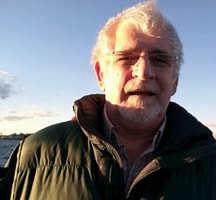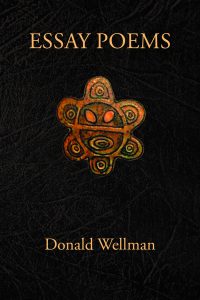 When I was sixteen, my father, then Master Sergeant of the Army Donald F. Wellman, returning late from an evening of disconsolate drinking, drove his 1958 Dodge station wagon with its peeled-back, rocket-ship wings into a small MG waiting at the gate to the Neckarsulm Kaserne, crushing the MG that waited there. With my father was the dishwasher who was the girlfriend of the company commander. In the red sports car was the commander and another woman, a vignette from occupied West Germany, circa1960. My father’s life began to unwind. Our mother, who wanted no part of his fate and who had always refused to accompany him to overseas postings, agreed to bring the children to Germany, including now my brother William. My father had begged her to relent and join him in hopes of saving himself from inevitable doom.
When I was sixteen, my father, then Master Sergeant of the Army Donald F. Wellman, returning late from an evening of disconsolate drinking, drove his 1958 Dodge station wagon with its peeled-back, rocket-ship wings into a small MG waiting at the gate to the Neckarsulm Kaserne, crushing the MG that waited there. With my father was the dishwasher who was the girlfriend of the company commander. In the red sports car was the commander and another woman, a vignette from occupied West Germany, circa1960. My father’s life began to unwind. Our mother, who wanted no part of his fate and who had always refused to accompany him to overseas postings, agreed to bring the children to Germany, including now my brother William. My father had begged her to relent and join him in hopes of saving himself from inevitable doom.
Prior to embarkation, we lived on Cranberry Island in the state of Maine, a place associated with our mother’s ancestral history. To attend Pemetic High School in Southwest Harbor, I boarded during the week with Agnes Trundy as did a bachelor dentist who loved Limburger cheese. I hunted sturgeon on moonlit bays. In Heilbronn, we lived for a time in dependent family housing. To attend the American high school, I took a train to Ludwigsburg. I was acutely aware of a group of young women who were commuting on the same line to a Roman Catholic girls’ school in Bad Cannstatt. The train made several stops, one rife with factory smells of chicory and roasted coffee. I watched old men play skat. One had a growth like a potato sprout emerging from the rim of his right ear. One of the girls invited me to her home. That was unfortunate. Her father owned a Mercedes Benz franchise. Simplicissimus, with her I shared my Tumbertor adventure. In illo tempore, we lazed upon a summer hillside in Göppingen. Of her appearance and personality, I have no memory. I was intoxicated. Her father banned me from further visits to their home. I have not led the life that I thought I had led. I was disconnected from the present though I was a capable observer. No one, including myself, knew that I was there.
Early mornings, I took Russian before school had properly begun. We read a novella by Nikolai Leskov. He writes extremely short stories. His documentary style is unblinking about the hardships suffered by both serfs and ordinary people. Severe whipping followed by overland marches to Siberia. In The Make-Up Artist, it appears to be criminal for the artist to succeed too well in transforming himself through art so as to appear to belong to a class higher than the one into which he was born. Leskov’s best known work is Lady Macbeth of Mtsensk (1865) which was made into an opera by Dimitri Shostakovich. This is a tale of unrelenting female passion in multiple forms. Later in my life, at some point after graduate school, Dimitri’s nightmare romance with Stalin haunted me “in the name of the father.” Leskov’s art, writes Walter Benjamin, frees the storyteller “from the burden of demonstrable explanation, moving freely upon the ladder of fairy tale and legend.” Mixing genres without affectation, his work is a prototype of heteroglossic fiction. In one story Leskov writes that for twelve years his mother raised Pisonski as a girl. His male and female parts matured simultaneously. His bisexuality “becomes the symbol of God incarnate.” Would it were me.
Another sadly afflicted individual, of a very different order, Newt Gingrich, was in my eleventh-grade English class. In a year he’d finish high school in Fort Benning Georgia and marry his geometry teacher, Jackie May Battley. They’ve had two daughters. For the most part, my generation of army brats were the children of soldiers who had served in Korea. Our English teacher, Mr. Bunce, was subject to torment and humiliation especially when he turned to diagram a sentence on the blackboard. The boys in the class owned slapsticks, two slats of wood that snapped together in a maddening dithyramb. Goat-footed satyrs. Me and Newt, all of us. That prop is prominent in Moliere’s The Physician in spite of Himself, or so I would learn when in the role of a servant I was free to whack superior bottoms. Sadistic miming. I began to identify with literary heroes who wrote poetry, the odd pairing of Milton and Byron. I loved wayward boys: one with golden hair with whom I visited the night alleys of Heilbronn. And Randy who lived in our stairwell. We set ourselves apart from others. We manufactured epic crossword puzzles, sixty-four squares in all directions. Our friends were young, enlisted men from Green Bay, paratroopers in the 101st Airborne Division, Screaming Eagles, only slightly older than ourselves. We took our soldier boyfriends to bars where prostitutes and pimps ruled the night. Reason enough for diffidence at that age. The girl I danced with wore an unyielding whalebone corset, perhaps plastic. She was not to be my Sue Bridehead, my muse or tormentor.
I dozed in senior English. The professor reprimanded me. I begged him to open the windows. The class cheered. We needed fresh air. I spoke heroically. He challenged me, poor strategy on his part, “Did I care to teach?” He went back to sipping whiskey from his thermos. “Go back, old man! Go back!” I commandeered the class. We were reading Jude the Obscure. My sympathy for Jude, his ambitions and his doom, cast a spell of magical tears over the class or so I thought. I shared Jude’s hopes. Self-absorption and desperation spoke in dulcet tones. The loathsome Arabella rhymed with my embarrassment in having dated an impoverished girl with a broken mouth from the backside of Mount Desert Island when I attended Pemetic in Southwest Harbor. Her mother picked crabmeat for a livelihood. The girl wanted me to take advantage of her. I rode a high horse that week! I refused. My friend Byron sat in the car with us. He was the first self-identified queer with whom I spent time. His hands calloused from hauling traplines. He went to Bangor with a wealthy man and they watched the ticker tape cascade inside its glass bell.
In Germany, the family romance went from awful to wretched. He who had been personal chef to General Douglas MacArthur in Korea was demoted to the rank of corporal because of his alcoholism and dereliction of duty. Army regulations required the family to move off the base and onto the local economy. My father found three rooms near the Knorr factory. Everything in that world was covered with yellow chicken soup dust. On July 7, 1962, I received my induction notice. I was 18. I had not registered for the draft. My wandering mind provided insufficient excuse for a deferment. In an upland meadow, I discovered a path named for the German poet Uhland. I recited the songs of Walther von der Vogelweide. After graduation, I planned to bicycle through the mustard fields of Dijon, incited by descriptive passages in Le Rouge et le Noir. But my future now found itself caught up in an untoward crisis. Passing out after guzzling sweet whisky, I caused a scene on a Neckar River cruise undertaken by my senior class in order to view the “son et lumière” at Heidelberg Castle. My date was a prostitute, another Arabella. She wisely made her own way home. I lay insensate on the floor of the men’s lavatory. The Green Police, as Brecht calls them, carried me home. Scalding coffee blistered my throat. Later I would write a Browning-esque monolog on this subject for my professor, the civil rights hero, G. Harris Daggett. Daggett had refused to testify before the House Un-American Affairs Committee. He lost his job at UNH but was later reinstated.
About to be exiled from West Germany as persona non grata, a high school guidance counselor, whose name I never knew, decided that a bright boy like me, as he assured the ladies of the Stuttgart Officers Wives Club, should not be condemned to perpetual shame but instead attend university. In this way, my first year of college was funded. During the awards banquet, academia claimed me even as poisonous slobber drained from my father’s mouth. Did the fine ladies notice? Soon, after an ocean crossing, on the SS Rose, an old ship that had once been a troop carrier, I caught a bus from Port Authority. At college, I undertook a quest for the discovery of my true father somewhere in the mists of legend. I share the Parsifal theme with Jack Kerouac. My stories about Sgt. Gott earned the praise of the novelist Thomas Williams. Williams also praised Randall Jarrell’s “The Death of the Bald Turret Gunner” as poetry of the highest quality. My father had been a mess sergeant not a hero. Isn’t there something misogynistic about that poem? I also studied poetry with Lawson Fusao Inada. I remember his poem in which a giant orange balloon rises above the Arizona desert where he and his family had been interred during World War II. Not that Jarrell’s images are not also indelible for a boy who was raised as a dependent of the U.S. Army, a hose washing blood out of the turret which is attached to the under belly of a bomber which is also a womb.
 Donald Wellman, poet, editor, and translator, his poetry is available from Dos Madres (Loveland OH), including Essay Poems 2017. Roman Exercises is from Talisman 2015. Books of translations include works by Emilio Prados, Antonio Gamoneda, and Roberto Echavarren. Expressivity in Modern Poetry is from Fairleigh Dickinson 2019. He also translated from French and German. He lives in Weare, NH.
Donald Wellman, poet, editor, and translator, his poetry is available from Dos Madres (Loveland OH), including Essay Poems 2017. Roman Exercises is from Talisman 2015. Books of translations include works by Emilio Prados, Antonio Gamoneda, and Roberto Echavarren. Expressivity in Modern Poetry is from Fairleigh Dickinson 2019. He also translated from French and German. He lives in Weare, NH.
